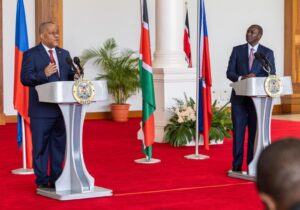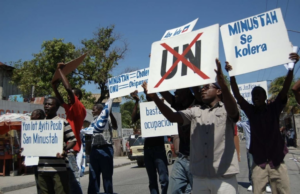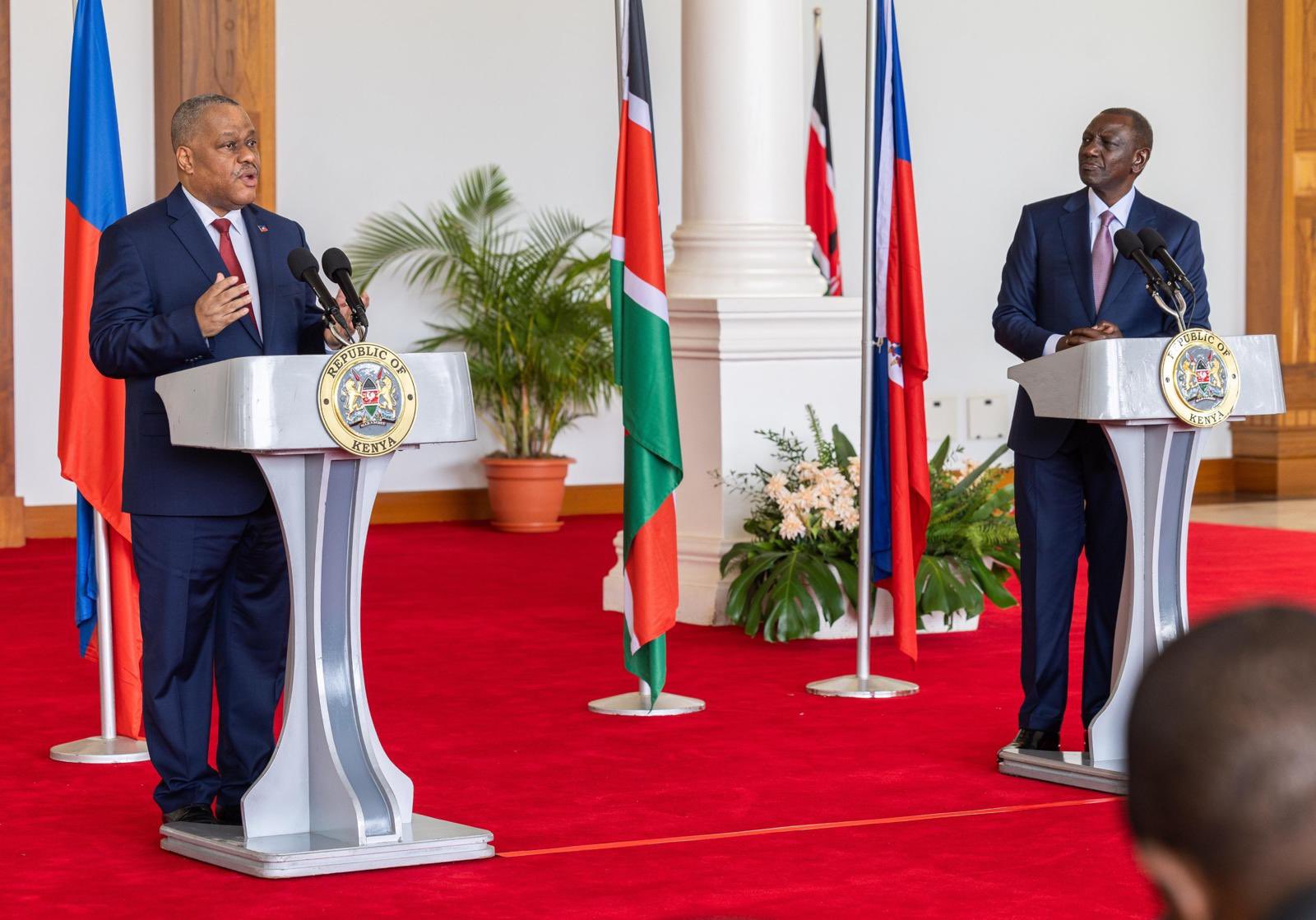Manufactured Disaster

(Prime Minister Garry Conille made an official visit to Kenya on October 11-12, 2024, at the invitation of Kenyan President William Ruto)
On October 11, 2024, Kenyan President William Ruto during a press conference,“confirmed that Haiti will receive 600 more Kenyan police officers next month, doubling the size of the strained international anti-gang force known as the Multinational Security Support ” (UsNews, 2024). The Kenyan-led police force– backed by the United States-is just the latest example of a long history of outside interventions that have done nothing to stabilize the country or stabilize its people. Haiti remains in a perpetual state of disaster, not just from natural disasters or internal conflict, but from decisions by foreign powers that have crippled the nation’s economy and hindered Haiti’s self-determination.
The U.S. military and “its proxies have been in Haiti for at least 41 of the last 108 years” (Foreign Policy, 2023) in the name of “democracy” and “peacekeeping”, and yet these interventions have continually failed to meet their stated objectives. Instead, they have undermined Haiti’s stability in order to justify their own economic and political agendas. From the pillaging of Haiti’s resources by the French to the more recent U.S imperialist occupations, foreign powers have created a legacy of exploitation, violence, and controversy. To free Haiti of disasters we need to get imperialist powers out of Haiti.
Why Kenya?
When President Biden was asked last year about the decision to send the Kenyan police he said it was the best thing for Haiti:“we’re in a situation where we want to do all we can without us looking like America once again is stepping over, deciding…Haitians are looking for help” (The Miami Herald,5/28/24). The U.S government is painfully aware of the terrible optics of sending in a white policy or troops into the Black island nation of Haiti. It would rather risk sending in Black bodies into a potentially disastrous war zone. Even if there’s a link of their own intervention in Haiti causing the chaos.

(President Joe Biden and President William Ruto of the Republic of Kenya shake hands after a joint press conference on Thursday, May 23, 2023 in Washington, D.C. during Ruto’s state visit to the United States. Jasper Colt Jasper Colt-USA TODAY)
This isn’t the first time Kenya has offered its military for United States missions. There is a long history of Kenya and the U.S collaborating in security-driven missions around the globe. Even though other Kenyan officials called the latest deployment unconstitutional, Ruto’s government has been unwavering in its effort to preserve a higher international standing from its friendship with the United States. There is a relation of mutualism that exists between Ruto and Biden have a mutually benefiting relationship. Kenya needs foreign investment to avoid defaulting on has $2 billion dollars in debt while the United States is intent on avoiding another peacekeeping scandal. In the end there is no such thing as altruistic help with foreign powers, there are only political agendas.
France coerces Haitian Reparations

(The Baron de Mackau of France presenting demands to Jean-Pierre Boyer, President of Haiti, in 1825)
We cannot discuss the history of outside intervention without how the country has been damaged economically and politically and how the United States learned from the French, which colonized Haiti in the 1700s. In 1825 “Twenty-one years after Haiti’s revolutionary heroes declared their country’s independence, swearing to die before being put back in chains or living under French domination again, a squadron of French warships — equipped with some 500 cannons — loomed off Haiti’s coastline”(Porter, New York Times). Angered by Haiti’s self determination, France threatened to invade the young country and blackmailed Haiti to reparations. What is most egregious is that France forced Haiti to take out high interest loans from French banks. This devastated Haiti’s economy and currency.“The ransom and the loan to pay it — a stunning load that boosted the fledgling Parisian international banking system and helped cement Haiti’s path into poverty”(Porter, New York Times). Haiti lost $560 million which would equate to $21 billion dollars today.
The first 1915 Intervention
The 1915 U.S intervention in Haiti while the U.S claims to have invaded Haiti “ to restore order and maintain political and economic stability in the Caribbean”, it was really for economic exploitation. The result was chaos, instability and disaster in Haiti. When the U.S troops arrived in Haiti in 1915 it quickly was able to strengthen and create a strong military force to protect the interests of U.S corporations and Haitian elite. Although the invasion would “end” with the Haitian-American Treaty of 1915, “this agreement created the Haitian Gendarmerie, essentially a military force made up of U.S. citizens and Haitians and controlled by the U.S. Marines. The United States gained complete control over Haitian finances, and the right to intervene in Haiti whenever the U.S. Government deemed necessary”. Two years later, Assistant Secretary of the NAVY Franklin D Roosevelt would rewrite Haiti’s constitution erasing“ longtime prohibitions against foreign investors buying land in Haiti”. Roosevelt boasted,, “The facts are that I wrote Haiti’s constitution myself and, if I do say it, I think it is a pretty good constitution “(Foreign Affairs, 7/1/41). In summation the United States centralized the Haitian government and military power, protected these new imperial interests and deputized the Haitian elite.

MINUSTAH Controversy
From 2004-2017 Haiti was occupied by the “peacekeepers” known as MINUSTAH, the U.N stabilization of Haiti mostly from Brazilian and Nepal, these soldiers were incredibly violent and left destruction amongst the Haitian working class. They facilitated sex trafficking, and were responsible for a cholera outbreak which killed up to 10,000-30,000 Haitians and infected over 800,000 sought out healthcare for symptom treatment. Even more disgustingly, the U.N took nearly 5 years to admit it was responsible and still has not provided any form of reimbursement or compensation for the Haitian lives the cholera outbreak took.
Where does that leave us? A Post Disaster Future
Like today’s Kenyan led police force, each of these foreign interventions or occupations claim to be attempting to create a more stable Haiti but today Haiti is more unstable than ever. It is also dependent on the U.S and other foreign corporations that do not serve the interests of the Haitian people. Haiti’s sovereignty and autonomy have been wiped out. One could say this was the foreign power’s goal all along.
As Jemima Pierre points out, Haiti can not be repaired by more violent international interference, especially from the United States. This sustained disaster in Haiti is one that is manufactured and cyclical, fueled by the interests of foreign power. To continue these self preservationary interventions would be to absolve the imperialist powers from their role in Haiti’s disaster in the first place. This historical revisionism and deliberate removal of agency from foreign powers will only lead to even further subjugation of the country. Instead Haiti needs global powers to take accountability for its plight, from the United States turning a blind eye to Haiti’s blackmail by France, to the rewriting of Haiti’s constitution, to the violent and ongoing “peacekeeping endeavors.” Additionally, the United States and France owe Haiti reparations for their role in its socioeconomic disaster. Part of that repayment should be a commitment to and financial investment in building critical infrastructure and maintaining a healthy society by legitimate Haitian organizations to prevent future corruption and funds outflowing from the country. The United Nations should also establish a centralized garbage and sewage system to contribute to disease prevention efforts in Haiti and support post-disaster rebuilding efforts.
To conclude a post-disaster future for Haiti is one free of intervention, systematic disenfranchisement and oppression. True sustainable equality, peace and safety will not come from big imperialist powers but from true accountability. In order for this to happen, Global Powers must reckon with their role in Haiti’s disaster and empower and center Haitians to create their own post-disaster world.
Al Jazeera English. “How Can Haiti Break Its Cycle of Violence and Instability? | UpFront.” YouTube, 22 Mar. 2024, www.youtube.com/watch?v=eGMoBmXPjIs. Accessed 14 Dec. 2024.
Charles, Jacqueline, and Michael Wilner. “Biden Explains Why U.S. Forces Not Involved in Haiti Gang Fight, Welcomes Kenya Leadership.” Miami Herald, 23 May 2024, www.miamiherald.com/news/nation-world/world/americas/haiti/article288681475.html. Accessed 14 Dec. 2024.
Gunther, John. “Hispaniola.” Foreign Affairs, July 1941, www.foreignaffairs.com/haiti/dominican-republic-hispaniola-first-colony-new-world.
“Haiti Crisis: Kenyan Police Deployed to Tackle Powerful Gangs.” Www.bbc.com, www.bbc.com/news/articles/cy7772v3j89o.
Hersher, Rebecca. “You Probably Don’t Want to Know about Haiti’s Sewage Problems.” NPR.org, 29 July 2017, www.npr.org/sections/goatsandsoda/2017/07/29/537945957/you-probably-dont-want-to-know-about-haitis-sewage-problems.
Katz, Jonathan M. “U.N. Admits Role in Cholera Epidemic in Haiti.” The New York Times, 18 Aug. 2016, www.nytimes.com/2016/08/18/world/americas/united-nations-haiti-cholera.html.
Kestler-D’Amours, Jillian. ““A Criminal Economy”: How US Arms Fuel Deadly Gang Violence in Haiti.” Al Jazeera, 25 Mar. 2024, www.aljazeera.com/news/longform/2024/3/25/a-criminal-economy-how-us-arms-fuel-deadly-gang-violence-in-haiti.
—. ““A Criminal Economy”: How US Arms Fuel Deadly Gang Violence in Haiti.” Al Jazeera, 25 Mar. 2024, www.aljazeera.com/news/longform/2024/3/25/a-criminal-economy-how-us-arms-fuel-deadly-gang-violence-in-haiti.
Lawal, Shola. “Why Are Kenyan Forces Set to Intervene in Haiti and How Is the US Involved?” Al Jazeera, 22 May 2024, www.aljazeera.com/news/2024/5/22/why-are-kenyan-forces-set-to-intervene-in-haiti-and-how-is-the-us-involved.
Lee, Sabine, and Susan Bartels. ““They Put a Few Coins in Your Hands to Drop a Baby in You” – 265 Stories of Haitian Children Abandoned by UN Fathers.” The Conversation, 17 Dec. 2019, theconversation.com/they-put-a-few-coins-in-your-hands-to-drop-a-baby-in-you-265-stories-of-haitian-children-abandoned-by-un-fathers-114854.
Office of the historian. “Milestones: 1914–1920 – Office of the Historian.” History.state.gov, history.state.gov/milestones/1914-1920/haiti.
Porter, Catherine, et al. “The Root of Haiti’s Misery: Reparations to Enslavers.” The New York Times, 20 May 2022, www.nytimes.com/2022/05/20/world/americas/haiti-history-colonized-france.html.
